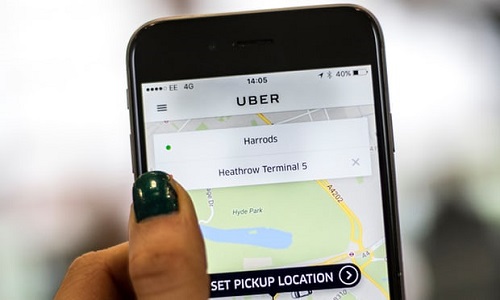Uber will allow UK users to leave a tip and will also charge passengers for keeping cabs waiting, as it attempts to take the sting out of a long-running dispute with drivers over labour rights.
The San Francisco-based firm, which has had a string of public image crises, including an alleged failure to report sex attacks, unveiled changes seemingly aimed at improving relations with drivers.
But the announcement was dismissed as a cynical PR move by the IWGB trade union, which is assisting Uber drivers in a legal tussle over their employment status.
Uber is appealing against last year’s landmark tribunal ruling granting its drivers employed worker status, which confers rights such as sick pay and the minimum wage.
{loadmodule mod_banners,nativeads}
With six weeks to go until the appeal begins, the company offered an olive branch including the tipping option, which is already available to users in the US and will go live in the UK from Tuesday.
It also announced a new waiting charge of 20p per minute, which will be levied on dawdling passengers from 22 August.
The penalty will be added to their bills once the driver has been waiting at the agreed pick-up point for two minutes.
Passengers will also have to pay a cancellation fee if they decide they do not want a car after two minutes, a reduction from the current five-minute grace period afforded to users of the smartphone app.
Drivers will also be given more control over which trips they accept. Also their performance rating on the app will not suffer when passengers are angered by something that is not the driver’s fault, such as a glitch in the app.
The changes are designed to limit the financial impact on drivers of matters beyond their control, such as passengers taking their time to get in the cab, or cancelling journeys when the driver is already on their way.
Jo Bertram, Uber’s UK regional general manager, said the decision to introduce tipping had come after feedback from drivers.
“Drivers’ time is valuable and every minute spent waiting for a rider means less time driving and making money,†she said.
The measures come before the next stage in a legal battle with two Uber drivers, James Farrar and Yaseen Aslam, who took the firm to court on behalf of a group 19 others. They argued that Uber employed them rather than them working for themselves.
It lost the case but was granted leave for an appeal aimed at protecting its existing arrangements with drivers, which will be heard at a two-day tribunal beginning on 27 September.
Farrar, who is lead claimant in the case and also chairs the cab drivers’ wing of the IWGB, said the measures announced by Uber did not address drivers’ concerns.
“This is a cynical PR move ahead of Uber’s appeal next month against last year’s employment tribunal ruling in favour of drivers,†he said.
“Despite its claims, Uber remains completely deaf to the most serious issue – excessively long hours, earning on average between £5 and £6 per hour.
“If Uber was more concerned about driver welfare than it is with propping up its own dreadful reputation, it would have abided by the tribunal’s decision and guaranteed drivers a minimum wage and holiday pay.â€
{loadmodule mod_banners,nativeads}
The IWGB said tipping was welcome but said the changes were “so timid and come so late in the game†that they would barely make any difference to drivers’ lives and working conditions.
Uber should “change its marketing messages which currently discourages tipping to encouraging it so that drivers are not caught between a good tip and a good ratingâ€, the union added.
But IPSE, the Association of Independent Professionals and the Self Employed, said the new terms provided further evidence that Uber was committed to providing a fairer deal for its “partner driversâ€.
The organisation, which worked with Uber to give drivers access to illness and injury cover this year, said the changes would “help reduce the inherent risks of self-employment without damaging the flexibility that so many drivers cite as their primary reason for working in this fashionâ€.
As well as the saga over the status of drivers, Uber’s public image has been tarnished by a series of allegations about the behaviour of drivers and executives alike.
Senior officers in the Metropolitan police accused the company of failing to report serious crimes by drivers, including an alleged sex attack and road rage incident involving the use of pepper spray.
{loadmodule mod_banners,nativeads}
Uber’s founder, Travis Kalanick, stepped down as chief executive last year amid accusations that he permitted a male-dominated culture of sexual impropriety within the company.
Kalanick is now being sued by investor Benchmark Capital, which is objecting to his retention of three seats on the company’s board.
Source:.theguardian.com





